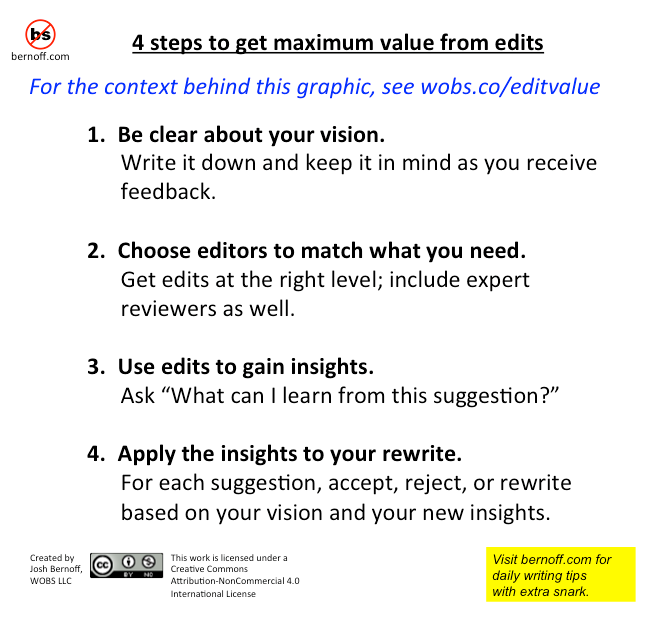How to take edits (and any other kind of advice)
You asked for feedback. You got their edits. Now what? Should you do what they say?
When it comes to edits (and, for that matter, advice on anything), the key principles is this:
[tweetthis]Editors exist to reveal what you cannot see, not to tell you what to do.[/tweetthis]
This is a crucial distinction. If you just do everything the editor tells you to, you are not a writer, you are a stenographer.
When you are seeking and addressing edits, take these steps
- Be clear about your vision.
- Choose editors to match what you need.
- Use edits to gain insights.
- Apply the insights to your rewrite.
Be clear about your vision.
Before starting a significant writing project, be clear about your readers, objectives, the action you are striving to create, and the impression you want to leave. Write these things down and post them on the wall in front of you as you write.
You need a clear vision, not just to improve your writing, but to confirm your sense of direction when you receive suggestions. You’re less likely to get lost if you have a map and a compass.
Choose editors to match what you need.
Figure out what level of edits you are seeking — do you need conceptual help, structural advice, or suggestions about wording? You should also seek out reviews from experts, such as people intimately familiar with your audience, subject matter experts, or technically knowledgeable reviewers.
Depending on requirements your writing must meet, you may also deal with obligatory reviews — legal experts, PR counsel, or your boss or project manager, for example.
No matter who edits you and for what reasons, set a deadline. Deadlines help both you and your editors to avoid wasting time waiting.
Use edits to gain insights.
The purpose of the editor is not to tell you what to do. You’re the writer and you have the vision. Their job is to show you what you cannot see.
An editor doing idea development can help you to clarify your vision. A structural editor can suggest frameworks in your writing that weren’t visible to you. A word editor can show you what to cut to make things stronger. A legal review can keep you from making promises you’ll regret later, while a copyeditor can save you from embarrassing grammatical mistakes.
But none of them know the topic the way you do.
[tweetthis]Nobody loves criticism. But it’s a lot easier to take if your attitude is, “What can I learn from this?”[/tweetthis]
If you’re not stuck on defending your flawed writing, you can learn a lot. This is where your vision comes in. With that vision clear in your mind, you can see which edits can make your writing more effective.
If you’re not sure what a particular critique is saying, talk to the editor who shared it with you. If you make it clear that you’re seeking insights, they’ll be happy to work with you.
Apply the insights to your rewrite.
Once you’ve gained the insights from your reviewers, use that knowledge to rewrite and improve your piece.
For each suggested edit, you should take one of three actions:
- Accept the edit and do what the editor says.
- Learn from what the editor suggests, and use that knowledge to make the writing better.
- Reject the edit, but because you have a good reason.
Bad writers lacking confidence accept all edits and lose control of their writing. Overconfident bad writers reject all edits and gain nothing from editing. Smart writers consider each edit carefully, mixing all three approaches. They find ways to harmonize conflicting advice from different reviewers, a skill that often leads to a more profound truth.
When it comes to those obligatory editors, like the legal department or your boss, rejecting all edits is not an option. So you’d better get good at option 2 or you’ll end up with a mess.
Some insights require a major rewrite. Knuckle down and do it. The result will be better than what you’ve got now.
What this means for life and career advice
All these principles apply to advice about things other than writing.
Have a vision for your life and your career. Know where you are going.
When you ask people for advice, know what you’re looking for. Do you want advice on how to ask for a raise? On how to deal with teenagers? On whether it’s time to quit your job, your marriage, or your mindset? Find out who you can trust to help you with these problems.
When you receive this advice, look for insights. What can you learn about yourself and your prospects?
Don’t just do what they say. Being a stenographer instead of a writer is bad enough; living someone else’s idea of your life is far worse. Instead, do what you think is best based on the new insights you’ve received.
And just as with editing, repeat continuously for best results.
